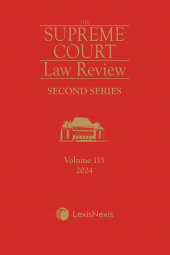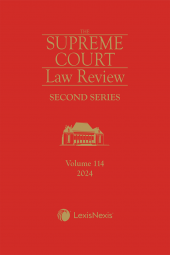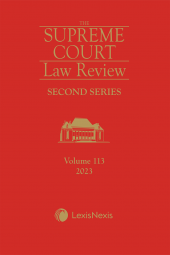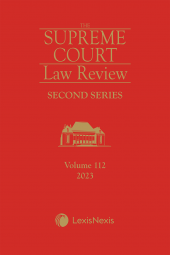Supreme Court Law Review, 2nd Series, Volume 115
One Year Subscription Only Terms
Subscribers receive the product(s) listed on the Order Form and any Updates made available during the annual subscription period. Shipping and handling fees are not included in the annual price.
Subscribers are advised of the number of Updates that were made to the particular publication the prior year. The number of Updates may vary due to developments in the law and other publishing issues, but subscribers may use this as a rough estimate of future shipments. Subscribers may call Customer Support at 800-833-9844 for additional information.
Subscribers may cancel this subscription by: calling Customer Support at 800-833-9844; emailing customer.support@lexisnexis.com; or returning the invoice marked 'CANCEL'.
If subscribers cancel within 30 days after the product is ordered or received and return the product at their expense, then they will receive a full credit of the price for the annual subscription.
If subscribers cancel between 31 and 60 days after the invoice date and return the product at their expense, then they will receive a 5/6th credit of the price for the annual subscription. No credit will be given for cancellations more than 60 days after the invoice date. To receive any credit, subscriber must return all product(s) shipped during the year at their expense within the applicable cancellation period listed above.
Product description
This volume is a collection of papers reviewing noteworthy Constitutional Law decisions of the Supreme Court of Canada released in 2022. The volume covers cases presented at Osgoode Hall Law School’s 26th Annual Constitutional Cases Conference of the Supreme Court of Canada.
This collection is divided into seven parts:
- PART I: The Year in Review
- PART II: Access to Justice
- PART III: The Reach of Judicial Review
- PART IV: Charter Equality, Indigeneity and Sentencing in R. v. Sharma
- PART V: Police Powers and the Exclusion of Evidence
- PART VI: Substantive Justice and Criminal Law
- PART VII: Scrutinizing the Supreme Court with Digital Technology
Table of contents
PART I—The Year in Review
The Constitution and Charter in 2022: The Court, the Chief Justice, and Justice Brown − Jamie Cameron
PART II—Access to Justice
Council of Canadians with Disabilities: Another Reminder to Resolve Cases on the Merits − Gerard J. Kennedy
From Rights to Justice: Perspectives on Access to Disability Justice in British Columbia (Attorney General) v. Council of Canadians with Disabilities – C. Tess Sheldon, Karen R. Spector and Ruby Dhand
PART III—The Reach of Judicial Review
Legislative Choices in Using Section 33 and Judicial Scrutiny – Robert Leckey
Un-Democratizing the City? Unwritten Constitutional Principles and Ontario’s Strong Mayor Powers – Alexandra Flynn
PART IV—Charter Equality, Indigeneity and Sentencing in R. v. Sharma
Sharma: The Erasure of Both Group-Based Disadvantage and Individual Impact – Jonnette Watson Hamilton and Jennifer Koshan
R. v. Sharma: Reckoning with Destabilizing Truths in Constitutional Equality Adjudication – Debra Parkes and Sonia Lawrence
How the Dissent in Sharma Opens the Door to Indigenize the Section 15(1) Charter Analysis – Alana Robert
PART V—Police Powers and the Exclusion of Evidence
A Lifeline During Custodial Interrogations? The Right to Counsel and Reflections on R. v. Dussault and R. v. Lafrance – Amar Khoday
Exploring the Intersectional and Spatial Implications of the Police Power to Search Dwellings Incident to Lawful Arrest: A Comment on R. v. Stairs – Danardo S. Jones
After Beaver: Reviving a Unified Test for Section 24 Charter Exclusion – Chris Rudnicki
PART VI—Substantive Justice and Criminal Law
Self-Induced Extreme Intoxication: Brown and Section 33.1 of the Criminal Code – Michelle S. Lawrence
R. v. J.J., Judicial Discretion and the Charter – Lisa Dufraimont
PART VII – Scrutinizing the Supreme Court with Digital Technology
Speaking Like a Judge: Using Artificial Intelligence to Empirically Assess Judicial Speech in Supreme Court of Canada Hearings by Language Spoken and Gender of the Speaker – Simon Wallace
Beyond the Numbers: Statistical and Data Literacy, Domain Literacy and Supreme Court of Canada Data Analytics – Jena McGill and Amy Salyzyn
A Quantitative Analysis of Leave Applications to the Supreme Court of Canada in Constitutional Cases – Paul-Erik Veel
 Lexis Nexis
Lexis Nexis 


